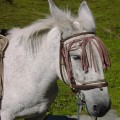IV - I due Muli
|||mules
IV - Τα δύο μουλάρια
IV - The two donkeys
IV - Las dos mulas
Un Mulo che portava sulla schiena dei sacchi d'or per conto dello Stato, tutto superbo camminava a lato d'un altro Mulo carico d'avena.
||||||||of gold||||state|||||||||loaded|of oats
Ein Maultier mit Säcken Gold auf dem Rücken für den Staat, alle stolz, ging neben einem anderen Maultier, das mit Hafer beladen war.
A mule carrying sacks of gold on his back for the state, all proud, walked beside another mule loaded with oats.
Devlet için sırtında çuvallar dolusu altın taşıyan bir katır, gururlu, yulaf yüklü başka bir katırın yanında yürüyordu.
Agitando la criniera colla bella sonagliera del nemico ei fu cagione che attirasse sull'oro l'attenzione.
||mane|with||jingle bells||enemy|he||||he attracted||
Indem er seine Mähne mit der schönen Glocke des Feindes schwenkte, war er der Grund, die Aufmerksamkeit auf Gold zu lenken.
By waving his mane with the enemy's beautiful bell, he was the reason that he drew attention to gold.
Düşmanın güzel çanı ile yelesini sallayarak dikkatleri altına çekmesinin sebebiydi.
Tratta dal buon bottin ecco una banda piomba sul regio Mulo, e una tempesta di colpi piove a lui sopra la testa che invan sospira e ragli al cielo manda.
|||bottin|||bande|tombe||||||||||||||||||||||
|||little book|||band|it plunges||regional||||||shots||||||||in vain|he sighs||he brays|||you send
Aus dem guten Boden genommen, fällt hier eine Bande auf das königliche Maultier, und ein Sturm von Schlägen regnet über seinem Kopf auf ihn, den er vergeblich seufzt und zum Himmel schreit, den er sendet.
Taken from the good bottin here a band falls on the royal Mule, and a storm of blows rains on him over his head that he sighs in vain and brays to the sky he sends.
Buradaki iyi bottan alınmış, kraliyet katırına bir grup düşüyor ve başının üzerine bir fırtına yağmuru yağıyor, boşuna iç çekiyor ve gökyüzüne anırmalar gönderiyor.
- Poveretto, - esclama, - a morte mi conduce l'alta sorte!
|||||it leads|the high|fate
»Armer Kerl«, ruft er aus, »das hohe Schicksal führt mich in den Tod!
'Poor fellow,' he exclaims, 'high fate leads me to death!
"Zavallı adam," diye haykırıyor, "kader beni ölüme götürüyor!
Te felice che d'avena, non di tesor hai carica la schiena!
|||d'avoine|||trésor||||
||||||treasure||you loaded||back
Sie freuen sich, dass Hafer, nicht Schatz, den Sie Ihren Rücken geladen haben!
You happy that oats, not treasure you have loaded your back!
Sırtınıza yüklenen hazineden değil, yulaftan mutlusunuz!
- Buon amico, è questo il guaio, degl'impieghi illustri ed alti, - gli rispose il camerata: - meglio il mulo d'un mugnaio che il dover far certi salti -.
|||||problème|des emplois|||||||camarade|||||meunier||||||sauts
|||||trouble|of the jobs|illustri||high||||comrade|||mule||miller||||||
"Guter Freund, das ist das Problem mit illustren und hohen Berufen", antwortete der Genosse, "besser ein Müller-Maultier als bestimmte Sprünge machen zu müssen".
'Good friend, this is the trouble with illustrious and high occupations,' replied the comrade: 'better a miller's mule than having to make certain leaps'.
- İyi dostum, şanlı ve yüksek mesleklerin sıkıntısı budur, - diye yanıtladı yoldaş: - belirli sıçramalar yapmaktansa bir değirmenci katırı daha iyidir -.

